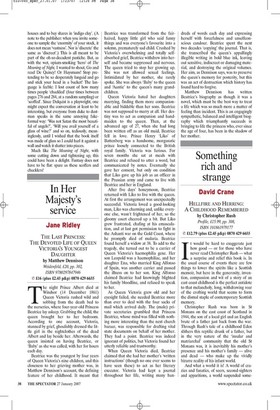In Her Majesty's service
Jane Ridley THE LAST PRINCESS: THE DEVOTED LIFE OF QUEEN VICTORIA'S YOUNGEST DAUGHTER by Matthew Dennison Weidenfeld, £20, pp. 302, ISBN 9780297847946 © £16 (plus £2.45 p&p) 0870 429 6655 The night Prince Albert died at Windsor (14 December 1861) Queen Victoria rushed wild and sobbing from the death bed to the nurseries, where four-year-old Princess Beatrice lay asleep. Grabbing the child, the queen brought her to her bedroom. According to one account, Victoria, stunned by grief, ghoulishly dressed the little girl in the nightclothes of the dead Albert and lay beside her. Afterwards, the queen insisted on having Beatrice, or 'Baby' as she was called, with her for hours each day.
Beatrice was the youngest by four years of Queen Victoria's nine children, and this closeness to her grieving mother was, in Matthew Dennison's account, the defining feature of her childhood. It meant that Beatrice was transformed from the fairhaired, happy little girl who said funny things and was everyone's favourite into a solemn, prematurely sad child. Crushed by Victoria's overwhelming and totally selfabsorbed grief, Beatrice withdrew into herself and became suppressed and nervous. The queen tried to stop her growing up. She was not allowed sexual feelings. Intimidated by her mother, she rarely spoke. She was always 'Baby' to the queen and 'Auntie' to the queen's many grandchildren.
Queen Victoria hated her daughters marrying, finding them more companionable and biddable than her sons. Beatrice was not supposed to marry at all. Her destiny was to act as companion and handmaiden to the queen. Then, at the advanced age of 27, when she had long been written off as an old maid, Beatrice fell in love. Prince Henry 'Elko' of Battenberg was a handsome, morganatic prince loosely connected to the British royal family. Victoria was furious. For seven months she sat at meals with Beatrice and refused to utter a word, but communicated by notes. Eventually she gave her consent, but only on condition that Liko gave up his job as an officer in the Prussian army and came to live with Beatrice and her in England.
After five days' honeymoon, Beatrice returned with Liko to live with the queen. At first the arrangement was unexpectedly successful. Victoria loved a good-looking man, Liko was charming and, unlike everyone else, wasn't frightened of her, so the gloomy court cheered up a bit. But Liko grew frustrated, chafing at his emasculation, and at last got permission to fight in the Ashanti war on the Gold Coast, where he promptly died of malaria. Beatrice found herself a widow at 38. To add to the tragedy, she turned out to be a carrier of Queen Victoria's haemophilia gene. Her son Leopold was a haemophiliac, and her daughter Ena, who married King Alfonso of Spain, was another carrier and passed the illness on to her son. King Alfonso claimed Beatrice had knowingly blighted his family bloodline, and refused to speak to her.
As Queen Victoria grew old and her eyesight failed, she needed Beatrice more than ever to deal with the four sacks of mail which arrived daily. The (male) private secretaries grumbled that Princess Beatrice, whose mind was filled with nothing more interesting than the next church bazaar, was responsible for drafting vital state documents on behalf of her mother. They had a point. Beatrice was indeed ignorant of politics, but Victoria found her utterly reliable and trustworthy.
When Queen Victoria died, Beatrice claimed that she had her mother's 'written instructions' (though no one ever seems to have seen these) to act as her literary executor. Victoria had kept a journal throughout her life, writing many hundreds of words each day and expressing herself with forcefulness and unselfconscious candour. Beatrice spent the next two decades 'copying' the journal. That is, she transcribed the queen's appallingly illegible writing in bold blue ink, leaving out sensitive, indiscreet or damaging material, and destroying the original volumes. Her aim, as Dennison says, was to preserve the queen's memory for posterity, but this was an act of destruction which history has found hard to forgive.
Matthew Dennison has written Beatrice's biography as though it was a novel, which must be the best way to treat a life which was so much more a matter of feeling than incident. This is an engagingly sympathetic, balanced and intelligent biography which triumphantly succeeds in bringing to life the princess who, ever since the age of four, has been in the shadow of her mother.














































 Previous page
Previous page